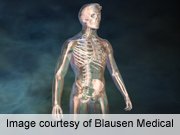
SUNDAY, March 4 (HealthDay News) — Vitamin E may stimulate cells that result in bone loss, a new study suggests.
Researchers led by Shu Takeda of Keio University in Tokyo said their findings could have implications for people who take vitamin E supplements.
The researchers explain that maintaining a balance between bone-forming cells (osteoblasts) and bone-degrading cells (osteoclasts) keeps bones strong. Although prior studies had suggested that vitamin E could be beneficial for bone health, the Japanese researchers found the opposite may be true, since the nutrient seems to trigger the production of bone-eroding osteoclasts.
A U.S. expert agreed with the hypothesis.
“Bone health is a dynamic tissue and issue,” said Dr. Robert Graham, an internist at Lenox Hill Hospital in New York City. “It is in a constant struggle between osteoblasts … and osteoclasts.”
Understanding this cellular battle “is crucial in understanding how vitamin E may affect our bone health,” Graham said.
The new study, published online March 4 in Nature Medicine, revealed that mice deficient in vitamin E actually have higher bone mass because there is less bone breakdown. Meanwhile, healthy mice that were fed a diet with the amount of vitamin E found in typical human supplements lost bone mass.
The study has revealed “the opposite of what was traditionally believed,” Graham said. “This is intriguing, because previous in vitro [laboratory] studies and mice studies have yielded contradictory results.”
Still, much more research is needed to better understand how vitamin E works in the skeletons of humans, Graham added. “Before we start telling people to throw away their vitamin E, let me state that these results are in mice and more studies are needed to see the risks and benefits in humans,” he said.
More information
The U.S. National Institutes of Health’s Office of Dietary Supplements provides more information on vitamin E.

